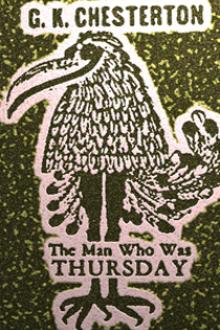The Man Who Was Thursday - G. K. Chesterton (best short books to read .TXT) 📗

- Author: G. K. Chesterton
- Performer: 1586170422
Book online «The Man Who Was Thursday - G. K. Chesterton (best short books to read .TXT) 📗». Author G. K. Chesterton
“And you think,” said Syme, “that this unique monster will be soothed if I play the piano to him?”
“Don’t be an ass,” said his mentor. “I mentioned the piano because it gives one quick and independent fingers. Syme, if we are to go through this interview and come out sane or alive, we must have some code of signals between us that this brute will not see. I have made a rough alphabetical cypher corresponding to the five fingers—like this, see,” and he rippled with his fingers on the wooden table—“B A D, bad, a word we may frequently require.”
Syme poured himself out another glass of wine, and began to study the scheme. He was abnormally quick with his brains at puzzles, and with his hands at conjuring, and it did not take him long to learn how he might convey simple messages by what would seem to be idle taps upon a table or knee. But wine and companionship had always the effect of inspiring him to a farcical ingenuity, and the Professor soon found himself struggling with the too vast energy of the new language, as it passed through the heated brain of Syme.
“We must have several word-signs,” said Syme seriously—“words that we are likely to want, fine shades of meaning. My favourite word is ‘coeval’. What’s yours?”
“Do stop playing the goat,” said the Professor plaintively. “You don’t know how serious this is.”
“‘Lush’ too,” said Syme, shaking his head sagaciously, “we must have ‘lush’—word applied to grass, don’t you know?”
“Do you imagine,” asked the Professor furiously, “that we are going to talk to Dr. Bull about grass?”
“There are several ways in which the subject could be approached,” said Syme reflectively, “and the word introduced without appearing forced. We might say, ‘Dr. Bull, as a revolutionist, you remember that a tyrant once advised us to eat grass; and indeed many of us, looking on the fresh lush grass of summer...’”
“Do you understand,” said the other, “that this is a tragedy?”
“Perfectly,” replied Syme; “always be comic in a tragedy. What the deuce else can you do? I wish this language of yours had a wider scope. I suppose we could not extend it from the fingers to the toes? That would involve pulling off our boots and socks during the conversation, which however unobtrusively performed—”
“Syme,” said his friend with a stern simplicity, “go to bed!”
Syme, however, sat up in bed for a considerable time mastering the new code. He was awakened next morning while the east was still sealed with darkness, and found his grey-bearded ally standing like a ghost beside his bed.
Syme sat up in bed blinking; then slowly collected his thoughts, threw off the bed-clothes, and stood up. It seemed to him in some curious way that all the safety and sociability of the night before fell with the bedclothes off him, and he stood up in an air of cold danger. He still felt an entire trust and loyalty towards his companion; but it was the trust between two men going to the scaffold.
“Well,” said Syme with a forced cheerfulness as he pulled on his trousers, “I dreamt of that alphabet of yours. Did it take you long to make it up?”
The Professor made no answer, but gazed in front of him with eyes the colour of a wintry sea; so Syme repeated his question.
“I say, did it take you long to invent all this? I’m considered good at these things, and it was a good hour’s grind. Did you learn it all on the spot?”
The Professor was silent; his eyes were wide open, and he wore a fixed but very small smile.
“How long did it take you?”
The Professor did not move.
“Confound you, can’t you answer?” called out Syme, in a sudden anger that had something like fear underneath. Whether or no the Professor could answer, he did not.
Syme stood staring back at the stiff face like parchment and the blank, blue eyes. His first thought was that the Professor had gone mad, but his second thought was more frightful. After all, what did he know about this queer creature whom he had heedlessly accepted as a friend? What did he know, except that the man had been at the anarchist breakfast and had told him a ridiculous tale? How improbable it was that there should be another friend there beside Gogol! Was this man’s silence a sensational way of declaring war? Was this adamantine stare after all only the awful sneer of some threefold traitor, who had turned for the last time? He stood and strained his ears in this heartless silence. He almost fancied he could hear dynamiters come to capture him shifting softly in the corridor outside.
Then his eye strayed downwards, and he burst out laughing. Though the Professor himself stood there as voiceless as a statue, his five dumb fingers were dancing alive upon the dead table. Syme watched the twinkling movements of the talking hand, and read clearly the message—
“I will only talk like this. We must get used to it.”
He rapped out the answer with the impatience of relief—
“All right. Let’s get out to breakfast.”
They took their hats and sticks in silence; but as Syme took his sword-stick, he held it hard.
They paused for a few minutes only to stuff down coffee and coarse thick sandwiches at a coffee stall, and then made their way across the river, which under the grey and growing light looked as desolate as Acheron. They reached the bottom of the huge block of buildings which they had seen from across the river, and began in silence to mount the naked and numberless stone steps, only pausing now and then to make short remarks on the rail of the banisters. At about every other flight they passed a window; each window showed them a pale and tragic dawn lifting itself laboriously over London. From each the innumerable roofs of slate looked like the leaden surges of a grey, troubled sea after rain. Syme was increasingly conscious that his new adventure had somehow a quality of cold sanity worse than the wild adventures of the past. Last night, for instance, the tall tenements had seemed to him like a tower in a dream. As he now went up the weary and perpetual steps, he was daunted and bewildered by their almost infinite series. But it was not the hot horror of a dream or of anything that might be exaggeration or delusion. Their infinity was more like the empty infinity of arithmetic, something unthinkable, yet necessary to thought. Or it was like the stunning statements of astronomy about the distance of the fixed stars. He was ascending the house of reason, a thing more hideous than unreason itself.
By the time they reached Dr. Bull’s landing, a last window showed them a harsh, white dawn edged with banks of a kind of coarse red, more like red clay than red cloud. And when they entered Dr. Bull’s bare garret it was full of light.
Syme had been haunted by a half historic memory in connection with these empty rooms and that austere daybreak. The moment he saw the garret and Dr. Bull sitting writing at a table, he remembered what the memory was—the French Revolution. There should have been the black outline of a guillotine against that heavy red and white of the morning. Dr. Bull was in his white shirt and black breeches only; his cropped, dark head might well have just come out of its wig; he might have been Marat or a more slipshod Robespierre.
Yet when he was seen properly, the French fancy fell away. The Jacobins were idealists; there was about this man a murderous materialism. His position gave him a somewhat new appearance. The strong, white light of morning coming from one side creating sharp shadows, made him seem both more pale and more angular than he had looked at the breakfast on the balcony. Thus the two black glasses that encased his eyes might really have been black cavities in his skull, making him look like a death’s-head. And, indeed, if ever Death himself sat writing at a wooden table, it might have been he.
He looked up and smiled brightly enough as the men came in, and rose with the resilient rapidity of which the Professor had spoken. He set chairs for both of them, and going to a peg behind the door, proceeded to put on a coat and waistcoat of rough, dark tweed; he buttoned it up neatly, and came back to sit down at his table.
The quiet good humour of his manner left his two opponents helpless. It was with some momentary difficulty that the Professor broke silence and began, “I’m sorry to disturb you so early, comrade,” said he, with a careful resumption of the slow de Worms manner. “You have no doubt made all the arrangements for the Paris affair?” Then he added with infinite slowness, “We have information which renders intolerable anything in the nature of a moment’s delay.”
Dr. Bull smiled again, but continued to gaze on them without speaking. The Professor resumed, a pause before each weary word—
“Please do not think me excessively abrupt; but I advise you to alter those plans, or if it is too late for that, to follow your agent with all the support you can get for him. Comrade Syme and I have had an experience which it would take more time to recount than we can afford, if we are to act on it. I will, however, relate the occurrence in detail, even at the risk of losing time, if you really feel that it is essential to the understanding of the problem we have to discuss.”
He was spinning out his sentences, making them intolerably long and lingering, in the hope of maddening the practical little Doctor into an explosion of impatience which might show his hand. But the little Doctor continued only to stare and smile, and the monologue was uphill work. Syme began to feel a new sickness and despair. The Doctor’s smile and silence were not at all like the cataleptic stare and horrible silence which he had confronted in the Professor half an hour before. About the Professor’s makeup and all his antics there was always something merely grotesque, like a gollywog. Syme remembered those wild woes of yesterday as one remembers being afraid of Bogy in childhood. But here was daylight; here was a healthy, square-shouldered man in tweeds, not odd save for the accident of his ugly spectacles, not glaring or grinning at all, but smiling steadily and not saying a word. The whole had a sense of unbearable reality. Under the increasing sunlight the colours of the Doctor’s complexion, the pattern of his tweeds, grew and expanded outrageously, as such things grow too important in a realistic novel. But his smile was quite slight, the pose of his head polite; the only uncanny thing was his silence.
“As I say,” resumed the Professor, like a man toiling through heavy sand, “the incident that has occurred to us and has led us to ask for information about the Marquis, is one which you may think it better to have narrated; but as it came in the way of Comrade Syme rather than me—”
His words he seemed to be dragging out like words in an anthem; but Syme, who was watching,





Comments (0)